An hourly schedule template helps your employees become more organized and efficient while performing their duties.
With the help of an hourly schedule template, you can keep track of what tasks an employee works on and how much time they take to finish it.
In this article, we’ll share five downloadable hourly schedule templates and discuss the pros and cons of using them. We’ll also explore a much better way to track your employee hours more precisely.
This article covers:
(Click on a link below to jump to a specific section)
- 5 Types of Hourly Schedule Templates
- Top 3 Benefits of Hourly Schedule Templates
- 3 Major Drawbacks of Using An Hourly Schedule Template
- A Better Alternative to Schedule Templates: Time Doctor
Let’s get started.
5 types of hourly schedule templates
An hourly schedule template, also known as a daily planner template, allows your employees to plan their day on an hourly basis.
It also helps you arrange and maintain your employees’ schedules in an organized manner.
With the help of a daily hourly planner template, your employees can write down their daily goals, design their work schedule, create daily progress reports, and many more.
Additionally, you can tweak the hourly schedule template to convert it into a daily schedule template for your employees. This can help them create a daily schedule in the worksheets and prioritize work accordingly.
Hourly schedule templates work best for businesses with similar employee shift schedules every week.
Savvy business people understand that time is their most valuable commodity. And such daily planner templates allow them to move forward the way they planned.
An hourly schedule template can be a to-do list template, hourly calendar template, weekly calendar template, and many more.
We’ll explore different types of free printable hourly schedule templates you can use for your business.
1. Hourly schedule template
With this daily hourly schedule template, you can track the work hours of your employees on a day-to-day basis. You can also record the tasks completed by your employees during that time period.
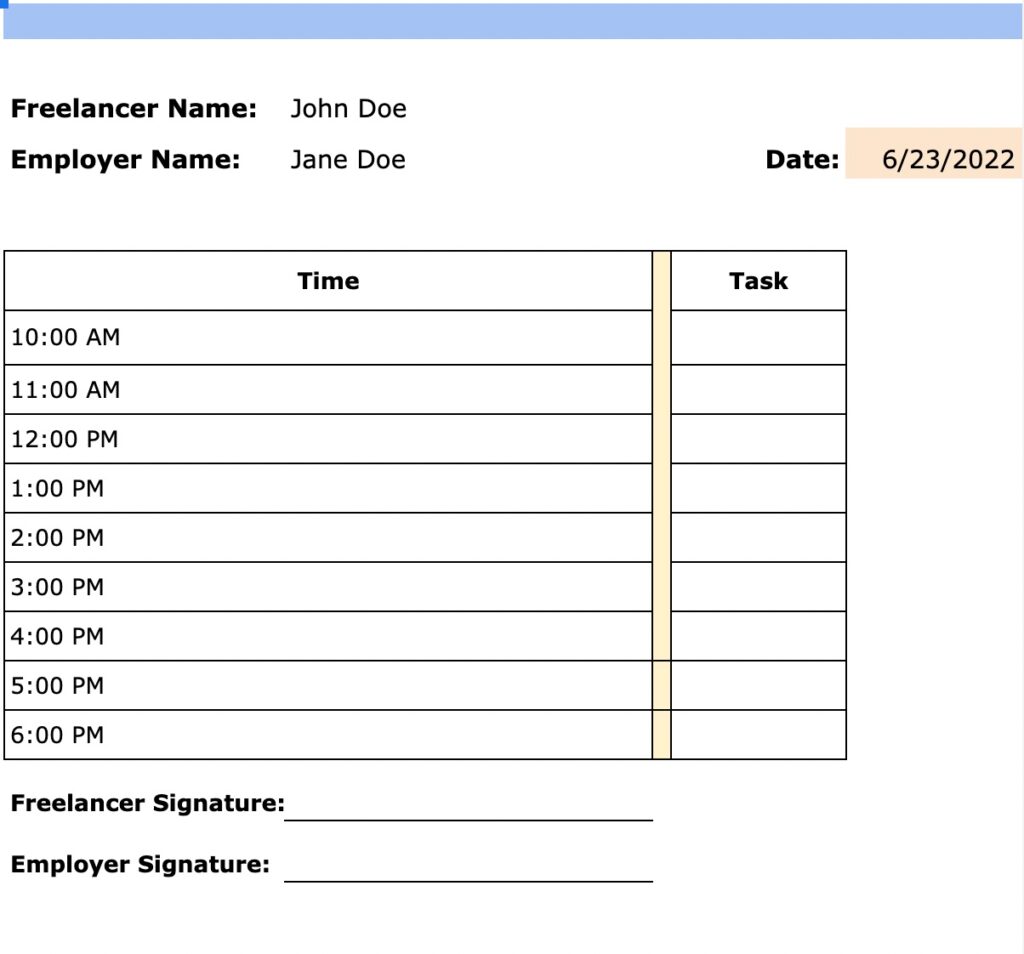
Download Links:
2. Weekly hourly template
A weekly hourly schedule template allows you to track the hourly work hours of your employees on a weekly basis. You can also use the weekly hourly planner to pay your employees or freelance workers every week.
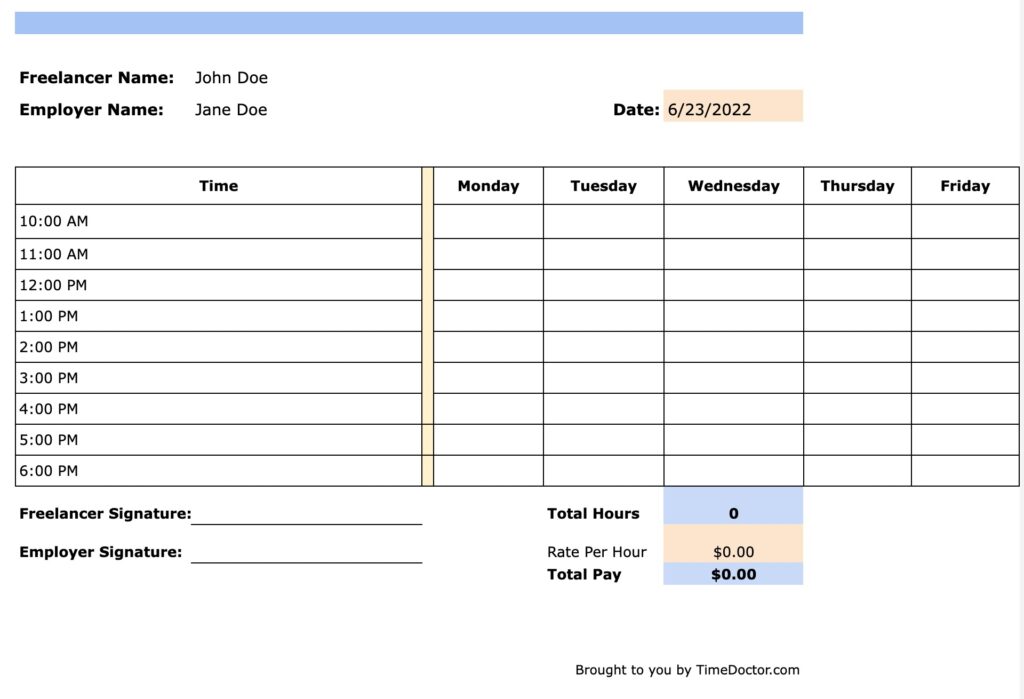
Download Links:
3. Hourly payroll schedule template
This is ideal for businesses looking to pay their hourly employees on a daily basis. You can track the daily work hours and pay your hourly employees accordingly.
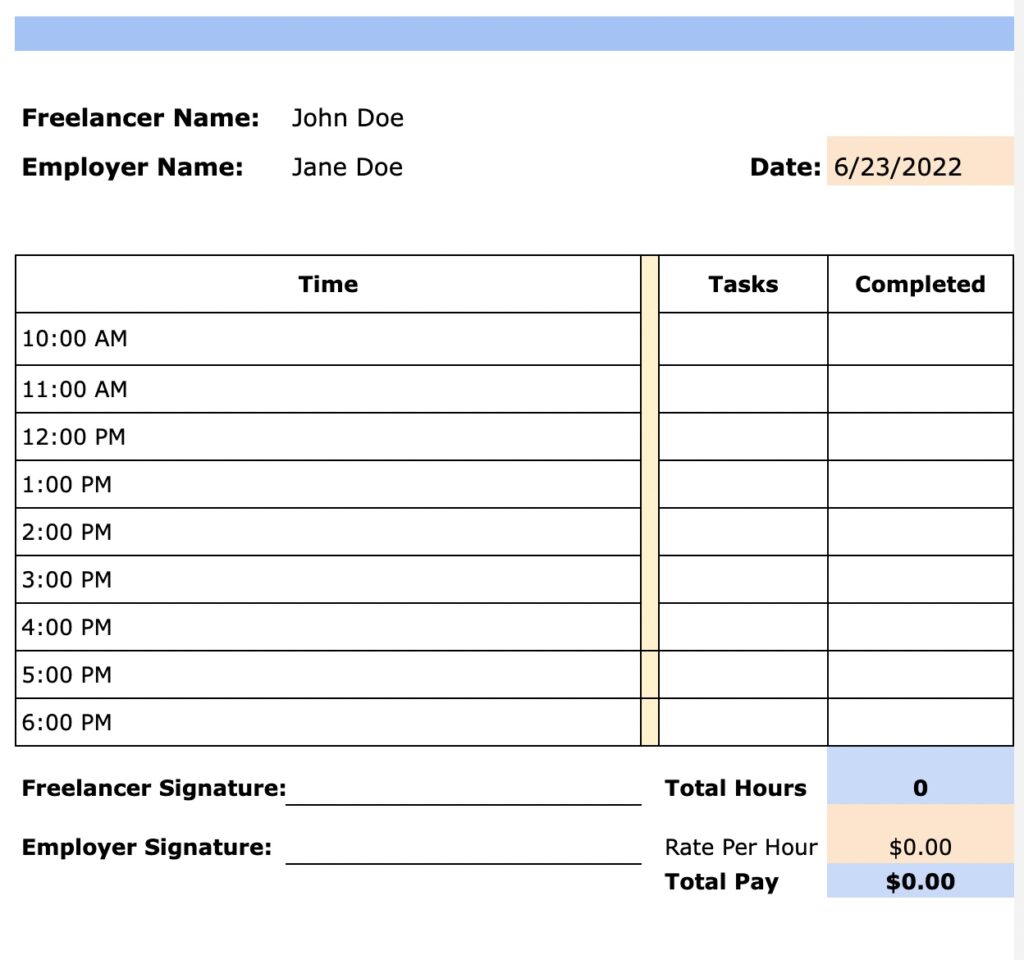
Download Links:
4. Pomodoro planner template
The Pomodoro technique is a time management system for professionals to work in half-hour intervals. In this system, the person will work for 25 minutes on a task and take a 5-minute break.
This template allows your employees to document their tasks using this technique for increased productivity.
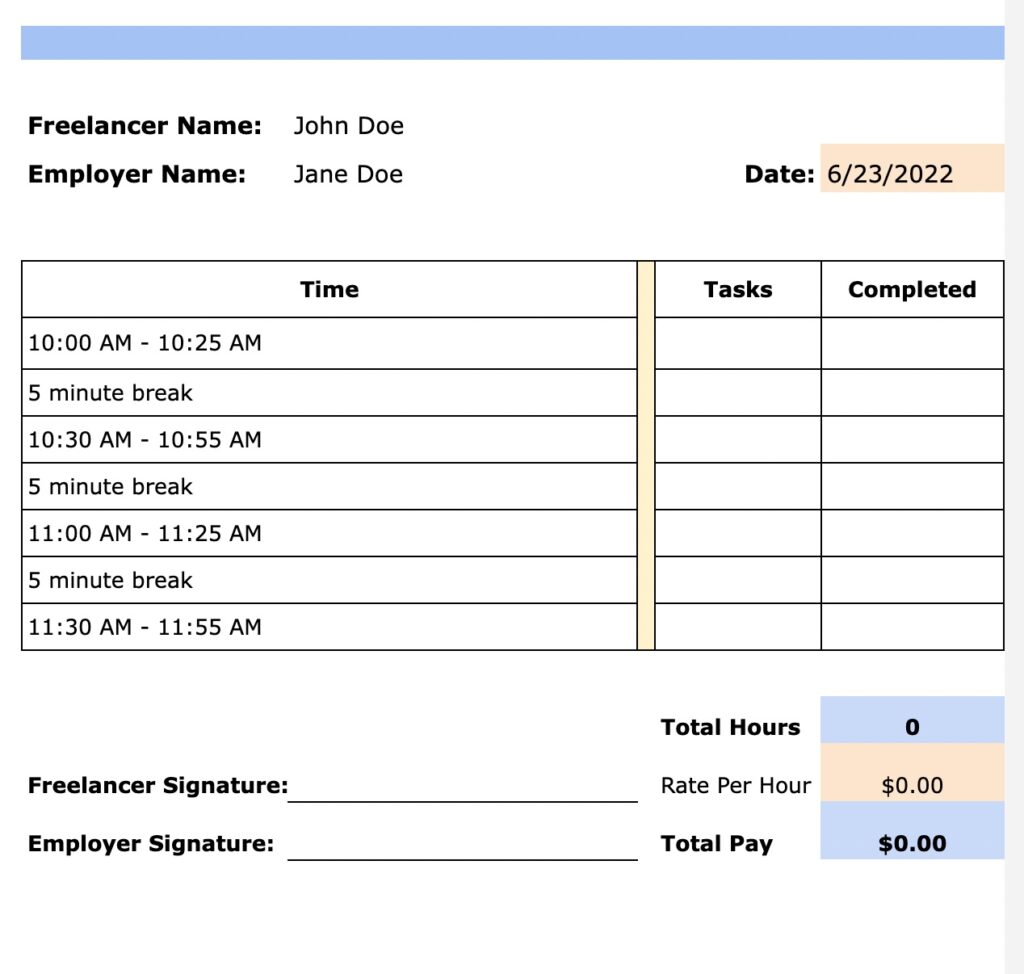
Download Links:
5. 24-hour shift schedule template
A 24-hour schedule maker template is mainly useful for businesses where employees work throughout the day in multiple shifts or locations.
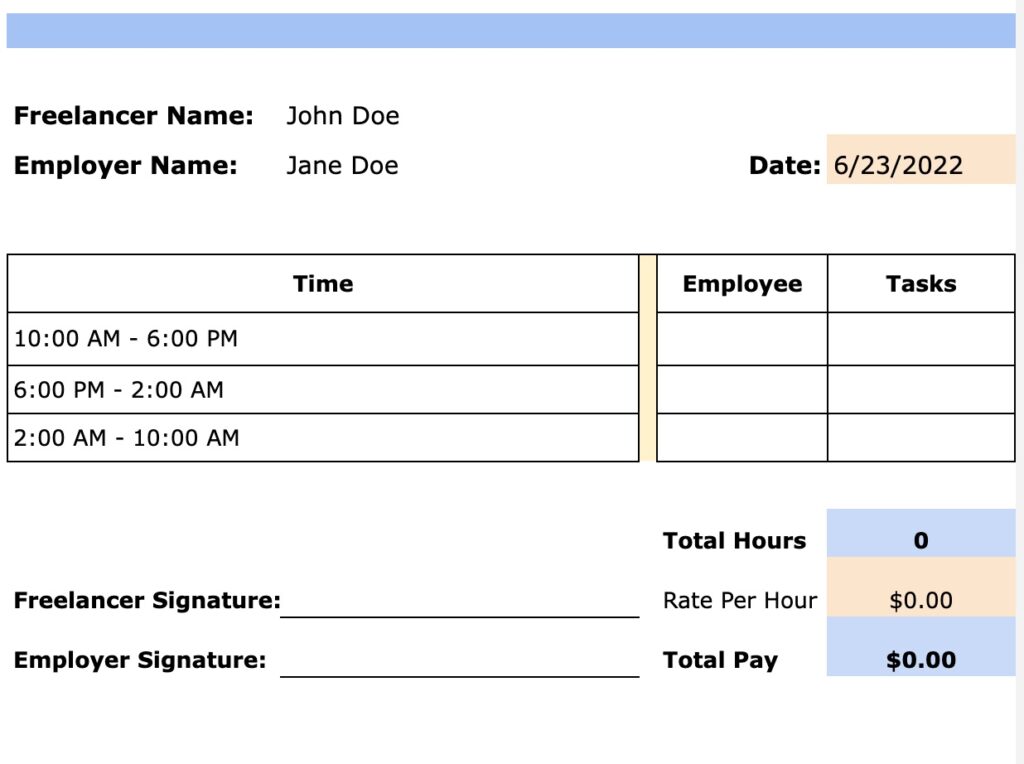
Download Links:
But why is it important to use an hourly planner template in the first place?
Let’s find out.
Top 3 benefits of hourly schedule templates
Using an hourly planner template on a regular basis can help your employees to dedicate their time to more urgent tasks.
How?
When your employees plan their day in advance, they can define their goals and have a clear vision of what they want to achieve.
This can help them improve their time management skills and keep track of their accomplishments.
We’ll take a closer look at the key benefits of using an hourly schedule template.
1. Spend less time on calculating hours
Generating the right number of shifts, calculating hours per shift, and assigning them to the right employees is an immensely time-consuming process.
With the help of a schedule template, you can create a 24-hour work schedule of day and night shifts accordingly. It’s simply a matter of filling in the slots to know how the hours were utilized.
2. Make scheduling consistent
A large part of employee scheduling is consistency.
The schedules will impact everything from employee productivity to workplace organization.
Once you find the right balance, the hourly and weekly schedule template allows you to save and re-create the most optimum schedules. And since employees prefer a consistent schedule, it will only benefit your business in the long run.
Additionally, there is a high correlation between strong scheduling and employee retention rate. In this way, a consistent time schedule helps you retain your best talent and avoid high turnover.
3. Become more flexible
A schedule template is easily editable, and the layouts can be tweaked according to your business needs.
For example, if you’re using a daily work schedule template, you can edit it by adding or removing employees or shifts as per your need.
Further, if a new member joins your company, you can easily customize the template based on other employees working on the same shift.
Clearly, hourly schedule templates are useful.
However, they have many shortcomings.
3 major drawbacks of using an hourly schedule template
Schedule templates are ideal for creating a quick work schedule for your team members.
But they suffer from several limitations, such as:
1. Prone to time manipulation
Since you don’t have any control over how your employees are using their time during work hours, an employee schedule template can be manipulated by entering falsified data, i.e., time theft.
For example, if an employee has underworked on a task, they may try to enter false time information.
This can lead to serious consequences in the long run for your organization.
For instance, if you pay your employees on an hourly basis, this time manipulation can result in excessive payments to your employees.
2. Lack of extensive productivity reports
An hourly schedule template will only give you access to time spent by employees on daily tasks and projects during the shift.
It doesn’t give you any insights into their productivity or if they were actually working on the task during those periods.
For example, you will not know whether your employees are working on assigned tasks or spending their valuable work time on social media.
3. Not scalable
Hourly schedule templates will do the job if you have a small team.
However, if you’re thinking of expanding your company to multiple locations, it can seriously hinder your company’s growth.
Your supervisors and managers will have to spend a great deal of time tracking and arranging template data, generating schedule reports, and other mundane activities. This may result in your employee’s valuable time and energy being wasted, harming your profit margin.
Considering the above factors, it’s not advisable to use daily, weekly, or monthly planner templates to manage your employee schedule.
So, how do you manage your employees’ schedules effectively?
An alternative to schedule templates: Time Doctor
Hourly schedule templates are popular among many small and large companies.
However, the lack of time tracking options and the potential for inaccurate entries make them ineffective for commercial use.
Fortunately, you can use an alternative like Time Doctor to track employee work hours.
What’s Time Doctor?
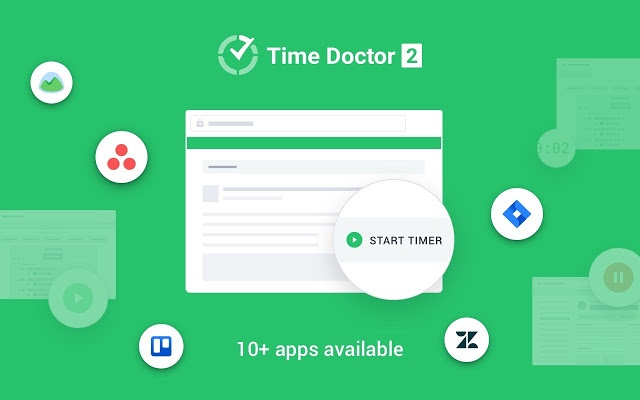
Time Doctor is a powerful employee time tracking and performance management tool. It’s used by major companies, like Ericsson and Keller Williams, as well as small businesses, like Thrive Market, to improve employee productivity.
You can use it to track the work hours of your employees, making it suitable for both in-office and remote teams.
Key features
Let’s take a look at some of Time Doctor’s key features:
1. Time tracking
Time Doctor offers two types of time tracking methods — automatic and interactive.
In the automatic time tracking mode, Time Doctor offers a silent version that tracks time silently in the background. The app will not have any effect on the employee’s day-to-day work and allows them to work without interruption.
In the interactive mode, your employees can start the timer on their own when they start working on a particular task and stop when the task is finished or to take a break.
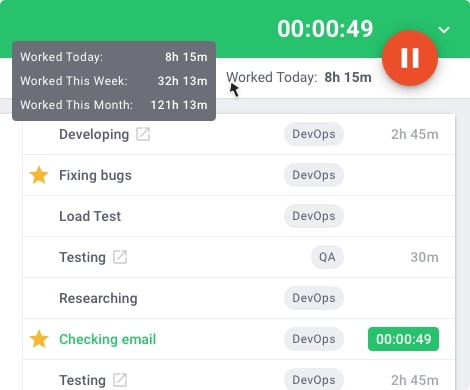
2. Idle time tracking
The idle time tracking feature allows you to check whether your employees are idle while working on a task or project.
If an employee does not engage in any keyboard, mouse, or computer activity for some time, Time Doctor automatically sends a pop-up notification. The pop-up alerts the employees and reminds them gently to focus on the task at hand.
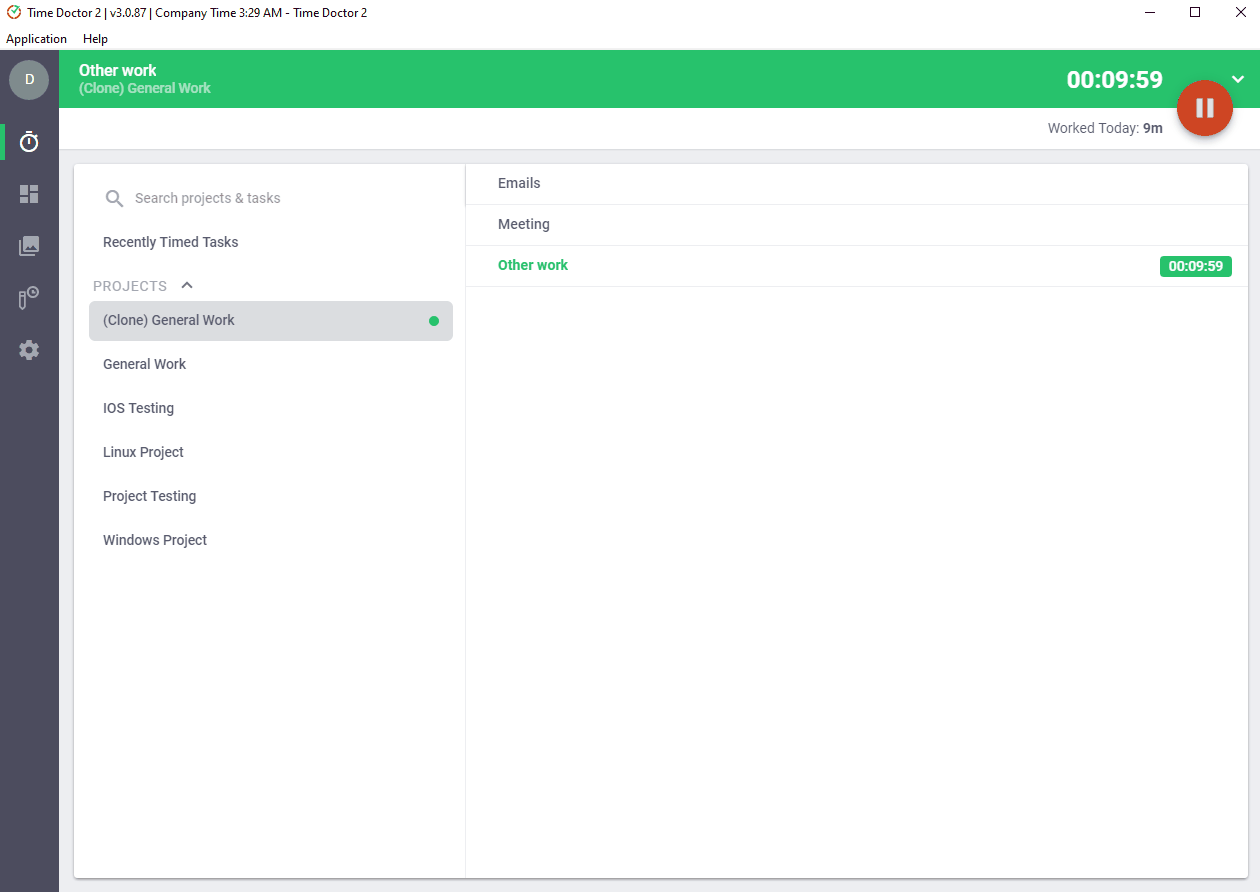
Note: Time Doctor isn’t a keystroke logger. It will only check if an employee pressed any keys or mouse buttons to calculate idle time.
3. Extensive productivity reports
Time Doctor allows you to access comprehensive real-time reports to understand employee performance.
These reports include:
- Attendance report: The report helps you to show whether an employee is absent, partially absent, present, or late.
- Hours tracked report: This report gives you access to how much your employees worked on any particular day, week, or any other date range you select.
- Timeline report: The timeline report lets you examine how much time your employee spends working daily or weekly.
- Projects and tasks report: Check your employee’s activity on any task or project.
- Web and app usage report: Get a detailed report of the time spent by your employees on different websites and applications.
- Activity summary report: View the active minutes, seconds, unproductive, and mobile time of each employee.
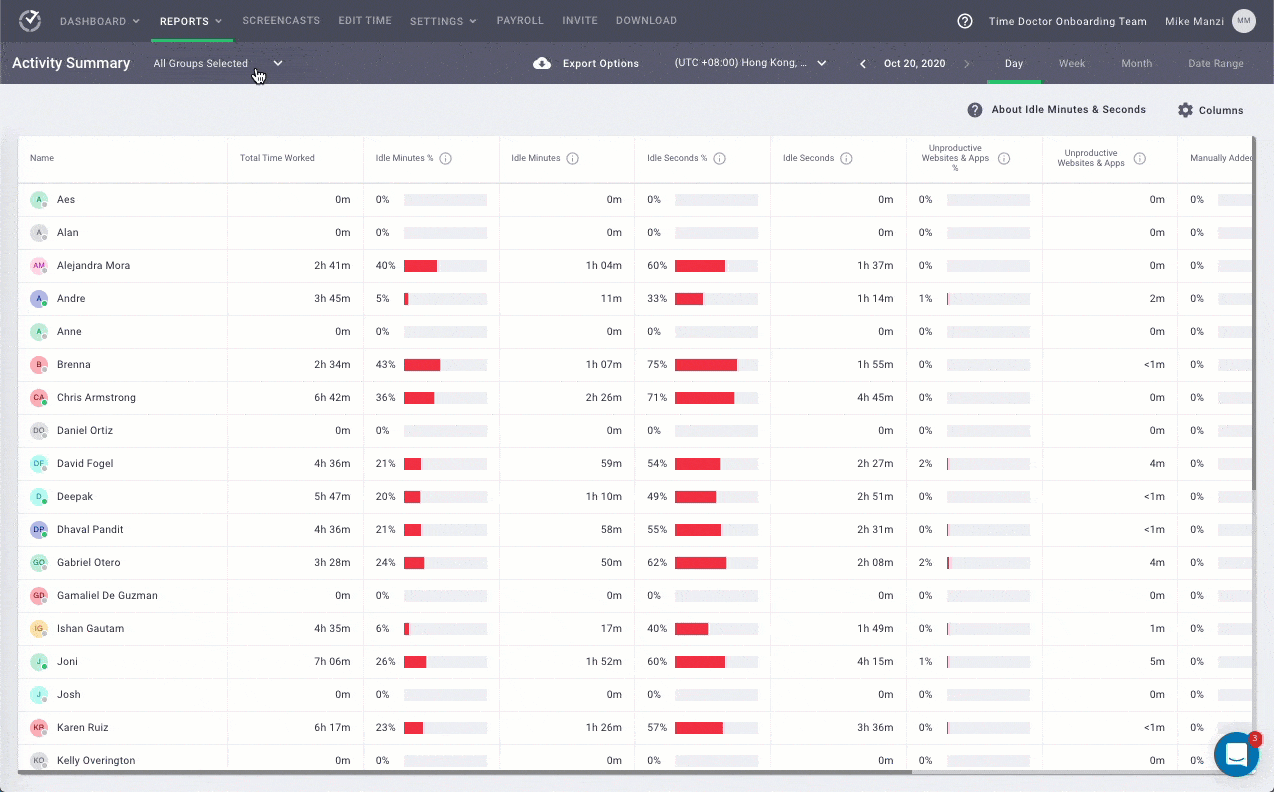
As a result, Time Doctor provides an accurate timesheet for each employee, logging in their hours on individual projects and tasks.
4. Productivity ratings
This feature lets you set different productivity ratings for various sites, depending on how relevant it’s for your employee’s work.
The different productivity ratings are:
- Productive.
- Unproductive.
- Neutral.
- Unrated.
For example, a social media manager might need access to social media platforms like Facebook and LinkedIn to run campaigns. The productivity rating feature will allow you to classify Facebook and LinkedIn as productive or neutral, whichever you need.
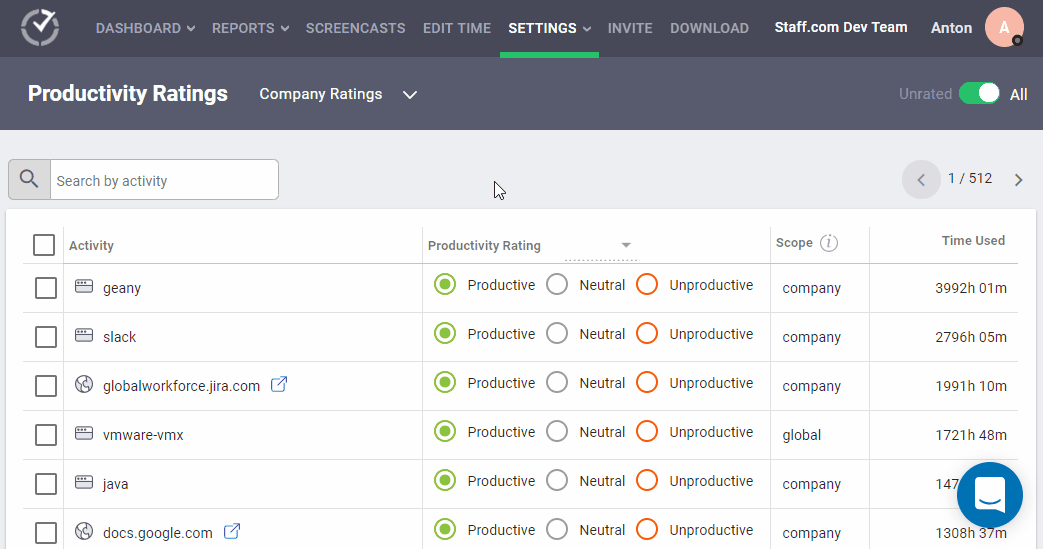
5. Screencasts (optional)
With the help of the optional screencasts feature, you can check whether your team members are working on an assigned task or not.
Additionally, your employees are less likely to engage in distracting activities during company time, if they’re aware that their screen activity is being monitored
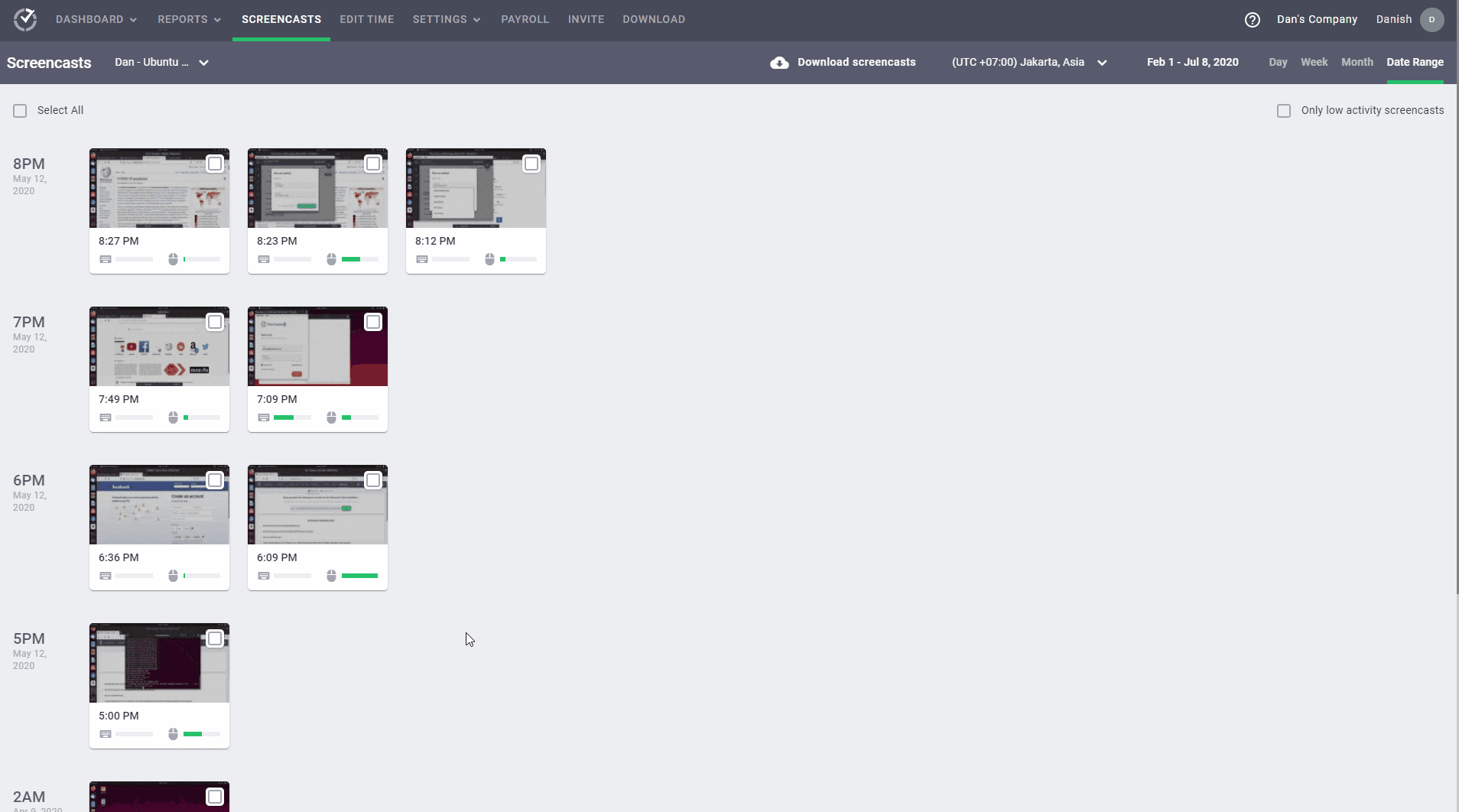
6. Payroll management
Time Doctor also provides you with payroll management features.
You can pay your in-office and remote employees via numerous methods like Paypal, Wise, or Gusto based on the time tracked on Time Doctor.
You have the option to customize the payroll feature by:
- Pay period.
- Payment methods.
- Payment currencies and pay rates.
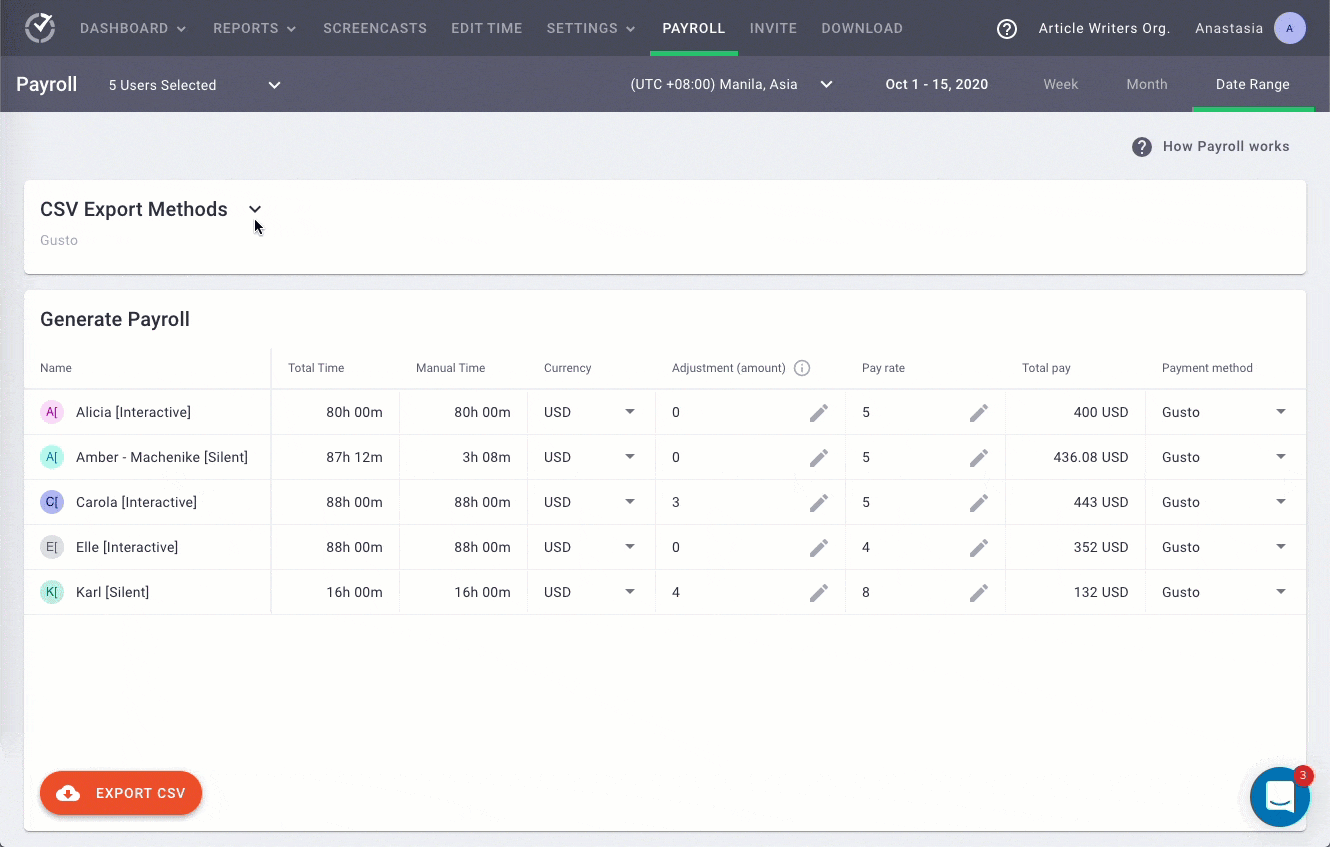
7. Robust Chrome Extension
You can integrate Time Doctor powerful Chrome Extension with other productivity apps like Slack, Asana, and Google Calendar.
This way, your team members can use Time Doctor with other work management apps to create a seamless employee experience.
With the help of Chrome Extension, your employees can track time across these apps without having to switch between multiple tabs or windows.
Check out more exciting Time Doctor features here.
Wrap up
Hourly schedule templates are a great scheduling option due to their ease of use and time-saving capabilities.
However, they aren’t designed to provide a detailed analysis of employee productivity and scheduling.
So, if you want an easy-to-use, accurate scheduling tool that also offers detailed productivity insights, Time Doctor is your best bet. From time-tracking to payroll management features, Time Doctor is the ideal alternative to hourly schedule templates.
So, why not sign up for Time Doctor’s free 14-day trial and increase your team productivity?

Carlo Borja is the Content Marketing Manager of Time Doctor, a workforce analytics software for distributed teams. He is a remote work advocate, a father and an avid coffee drinker.


